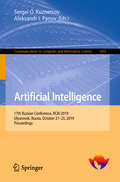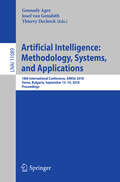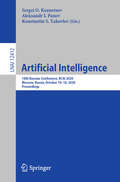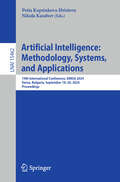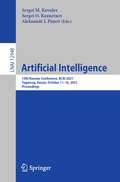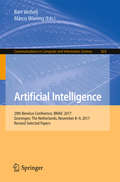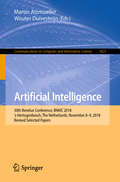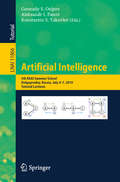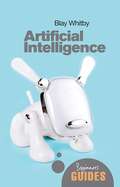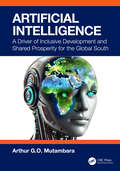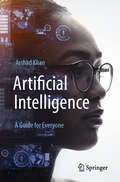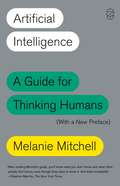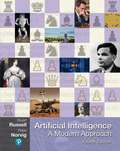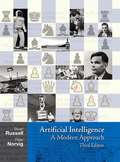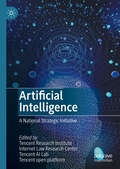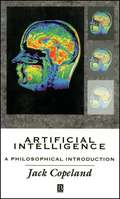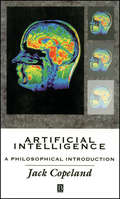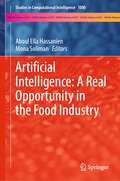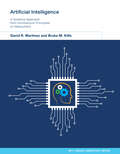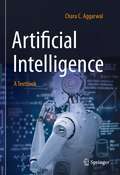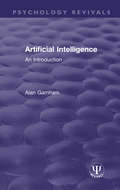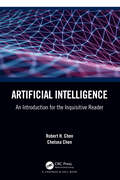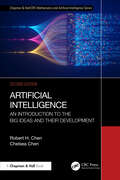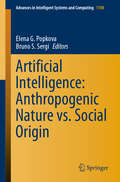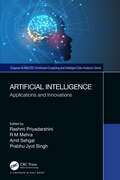- Table View
- List View
Artificial Intelligence: 17th Russian Conference, RCAI 2019, Ulyanovsk, Russia, October 21–25, 2019, Proceedings (Communications in Computer and Information Science #1093)
by Sergei O. Kuznetsov Aleksandr I. PanovThis book constitutes the proceedings of the 17th Russian Conference on Artificial Intelligence, RCAI 2019, held in Ulyanovsk, Russia, in October 2019. The 23 full papers presented along with 7 short papers in this volume were carefully reviewed and selected from 130 submissions. The conference deals with a wide range of topics, including multi-agent systems, intelligent robots and behaviour planning; automated reasoning and data mining; natural language processing and understanding of texts; fuzzy models and soft computing; intelligent systems and applications.
Artificial Intelligence: 18th International Conference, AIMSA 2018, Varna, Bulgaria, September 12–14, 2018, Proceedings (Lecture Notes in Computer Science #11089)
by Gennady Agre Thierry Declerck Josef Van GenabithThis book constitutes the refereed proceedings of the 18th International Conference on Artificial Intelligence: Methodology, Systems, and Applications, AIMSA 2018, held in Varna, Bulgaria, in September 2018.The 22 revised full papers and 7 poster papers presented were carefully reviewed and selected from 72 submissions. They cover a wide range of topics in AI: from machine learning to natural language systems, from information extraction to text mining, from knowledge representation to soft computing; from theoretical issues to real-world applications.
Artificial Intelligence: 18th Russian Conference, RCAI 2020, Moscow, Russia, October 10–16, 2020, Proceedings (Lecture Notes in Computer Science #12412)
by Sergei O. Kuznetsov Aleksandr I. Panov Konstantin S. YakovlevThis book constitutes the proceedings of the 18th Russian Conference on Artificial Intelligence, RCAI 2020, held in Moscow, Russia, in October 2020. The 27 full papers and 8 short papers presented in this volume were carefully reviewed and selected from 140 submissions. The conference deals with a wide range of topics, including data mining and knowledge discovery, text mining, reasoning, decisionmaking, natural language processing, vision, intelligent robotics, multi-agent systems,machine learning, AI in applied systems, and ontology engineering.
Artificial Intelligence: 19th International Conference, AIMSA 2024, Varna, Bulgaria, September 18–20, 2024, Proceedings (Lecture Notes in Computer Science #15462)
by Petia Koprinkova-Hristova Nikola KasabovThis book constitutes the refereed proceedings of the 19th International Conference on Artificial Intelligence: Methodology, Systems, and Applications, AIMSA 2024, held in Varna, Bulgaria, during September 18–20, 2024. The 18 revised full papers presented in this book were carefully reviewed and selected from 23 submissions. They cover a wide range of topics in AI and its applications: natural language processing, sentiment analyses, image processing, optimization, reinforcement learning, from deep ANNs to spike timing NNs, applications in economics, medicine and process control.
Artificial Intelligence: 19th Russian Conference, RCAI 2021, Taganrog, Russia, October 11–16, 2021, Proceedings (Lecture Notes in Computer Science #12948)
by Sergei O. Kuznetsov Aleksandr I. Panov Sergei M. KovalevThis book constitutes the proceedings of the 19th Russian Conference on Artificial Intelligence, RCAI 2021, held in Moscow, Russia, in October 2021. The 19 full papers and 7 short papers presented in this volume were carefully reviewed and selected from 80 submissions. The conference deals with a wide range of topics, categorized into the following topical headings: cognitive research; data mining, machine learning, classification; knowledge engineering; multi-agent systems and robotics; natural language processing; fuzzy models and soft computer; intelligent systems; and tools for designing intelligent systems.
Artificial Intelligence: 29th Benelux Conference, BNAIC 2017, Groningen, The Netherlands, November 8-9, 2017, Revised Selected Papers (Communications In Computer And Information Science #823)
by Bart Verheij Marco WieringThis book contains a selection of the best papers of the 29th Benelux Conference on Artificial Intelligence, BNAIC 2017, held in Groningen, The Netherlands, in November 2017. <p><p> The 11 full papers presented in this volume were carefully reviewed and selected from 30 submissions. They address various aspects of artificial intelligence such as natural language processing, agent technology, game theory, problem solving, machine learning, human-agent interaction, AI and education, and data analysis.
Artificial Intelligence: 30th Benelux Conference, BNAIC 2018, ‘s-Hertogenbosch, The Netherlands, November 8–9, 2018, Revised Selected Papers (Communications in Computer and Information Science #1021)
by Martin Atzmueller Wouter DuivesteijnThis book contains a selection of the best papers of the 30th Benelux Conference on Artificial Intelligence, BNAIC 2018, held in ‘s-Hertogenbosch, The Netherlands, in November 2018. The 9 full papers and 3 short papers presented in this volume were carefully reviewed and selected from 31 submissions. They address various aspects of artificial intelligence such as natural language processing, agent technology, game theory, problem solving, machine learning, human-agent interaction, AI and education, and data analysis.
Artificial Intelligence: 5th RAAI Summer School, Dolgoprudny, Russia, July 4–7, 2019, Tutorial Lectures (Lecture Notes in Computer Science #11866)
by Gennady S. Osipov Aleksandr I. Panov Konstantin S. YakovlevThis volume contains selected tutorial and young scientist school papers of the 5th RAAI Summer School on Artificial Intelligence, held in July 2019 at Institute of Physics and Technology (MIPT) campus in Dolgoprudny, a suburb of Moscow, Russia. The 11 chapters in this volume present papers focusing on various important aspects of Multiagent systems; Behavior planning; Natural language processing; Modeling of reasoning; and Machine learning and data analysis.
Artificial Intelligence: A Beginner's Guide (Beginner's Guides)
by Blay WhitbyTomorrow begins right here as we embark on an enthralling and jargon-free journey into the world of computers and the inner recesses of the human mind. Readers encounter everything from the nanotechnology used to make insect-like robots, to computers that perform surgery, in addition to discovering the biggest controversies to dog the field of AI. Blay Whitby is a Lecturer on Cognitive Science and Artificial Intelligence at the University of Sussex UK. He is the author of two books and numerous papers.
Artificial Intelligence: A Driver of Inclusive Development and Shared Prosperity for the Global South
by Arthur G.O. MutambaraThis book presents contextualised and detailed research on Artificial Intelligence (AI) and the Global South. It examines the key challenges of these emerging and least industrialised countries while proffering holistic and comprehensive solutions. The book then explains how AI, as part of these broad interventions, can drive Global South economies to achieve inclusive development and shared prosperity. The book outlines how countries can swiftly prepare to adopt and develop AI across all sectors. It presents novel national, regional, and continental AI adoption, development, and implementation frameworks.Features: Broad non-AI interventions and prescriptions to address Global South challenges A comprehensive but accessible introduction to AI concepts, technology, infrastructure, systems, and innovations such as AlphaFold, ChatGPT-4, and DeepSeek-R1 An overview of AI-related technologies such as quantum computing, battery energy storage systems, 3D printing, nanotechnology, IoT, and blockchain How to prepare emerging economies to unlock the benefits of AI while mitigating the risks Discussion of specific AI applications in 11 critical Global South sectors Details of 11 sector case studies of AI adoption in the Global South and Global North Ten country case studies: Sharing emergent AI experiences in the Global South AI adoption framework: vision, strategy, policy, governance, legislation/regulation, and implementation matrix A framework for democratising and decolonising AI The value proposition for AI research, development, and ownership in the Global South A case for the participation of the Global South in the AI semiconductor industry This book is aimed at policymakers, business leaders, graduate students, academics, researchers, strategic thinkers, and world leaders seeking to understand and leverage the transformative role of AI-based systems in achieving inclusive development, economic transformation, and shared prosperity.
Artificial Intelligence: A Guide for Everyone
by Arshad KhanEnterprises, as well as individuals, are racing to reap the benefits of AI. However, in most cases, they are doing so without understanding the technology or its implications and risks, which can be significant. Artificial Intelligence: A Guide for Everyone is a step in addressing that gap by providing information that readers can easily understand at every level. This book aims to provide useful information to those planning, developing, or using AI, which has the potential to transform industries and shape the future. Whether you are stepping into the world of AI for the first time or are a seasoned professional seeking deeper insights, this comprehensive guide ensures that both beginners and experienced individuals find value within its pages. Artificial Intelligence: A Guide for Everyone encompasses theoretical as well as practical aspects of AI across various industries and applications. It demystifies AI by explaining, in a language that non-techies can follow, its history, different types, differentiating technologies, and various aspects of implementation. It explains the connection between AI theory and real-world application across diverse industries and how it fuels innovation. Whether you are an executive, student, professional, seasoned businessperson, or simply curious about the future of technology, Artificial Intelligence: A Guide for Everyone equips you with the knowledge to navigate this transformative field with confidence.
Artificial Intelligence: A Guide for Thinking Humans (Pelican Bks.)
by Melanie Mitchell“After reading Mitchell’s guide, you’ll know what you don’t know and what other people don’t know, even though they claim to know it. And that’s invaluable.” —The New York TimesA leading computer scientist brings human sense to the AI bubble.No recent scientific enterprise has proved as alluring, terrifying, and filled with extravagant promise and frustrating setbacks as artificial intelligence. The award-winning author Melanie Mitchell, a leading computer scientist, now reveals AI’s turbulent history and the recent spate of apparent successes, grand hopes, and emerging fears surrounding it.In Artificial Intelligence, Mitchell turns to the most urgent questions concerning AI today: How intelligent—really—are the best AI programs? How do they work? What can they actually do, and when do they fail? How humanlike do we expect them to become, and how soon do we need to worry about them surpassing us? Along the way, she introduces the dominant models of modern AI and machine learning, describing cutting-edge AI programs, their human inventors, and the historical lines of thought underpinning recent achievements. She meets with fellow experts such as Douglas Hofstadter, the cognitive scientist and Pulitzer Prize–winning author of the modern classic Gödel, Escher, Bach, who explains why he is “terrified” about the future of AI. She explores the profound disconnect between the hype and the actual achievements in AI, providing a clear sense of what the field has accomplished and how much further it has to go. Interweaving stories about the science of AI and the people behind it, Artificial Intelligence brims with clear-sighted, captivating, and accessible accounts of the most interesting and provocative modern work in the field, flavored with Mitchell’s humor and personal observations. This frank, lively book is an indispensable guide to understanding today’s AI, its quest for “human-level” intelligence, and its impact on the future for us all.
Artificial Intelligence: A Modern Approach
by Stuart Russell Peter NorvigArtificial Intelligence: A Modern Approach (AIMA) is a university textbook on artificial intelligence, written by Stuart J. Russell and Peter Norvig. It was first published in 1995 and the fourth edition of the book was released 28 April 2020. It is used in over 1400 universities worldwide and has been called "the most popular artificial intelligence textbook in the world". It is considered the standard text in the field of artificial intelligence. The book is intended for an undergraduate audience but can also be used for graduate-level studies with the suggestion of adding some of the primary sources listed in the extensive bibliography.
Artificial Intelligence: A Modern Approach, Third Edition
by Peter Norvig Stuart J. RussellThis third edition of Artificial Intelligence: A Modern Approach offers the most comprehensive, up-to-date introduction to the theory and practice of artificial intelligence. This textbook is useful for one or two-semester, undergraduate or graduate-level courses in Artificial Intelligence.
Artificial Intelligence: A National Strategic Initiative
by Tencent Research Institute Caict Tencent Ai Lab Tencent Open PlatformThis book begins with the past and present of the subversive technology of artificial intelligence, clearly analyzes the overall picture, latest developments and development trends of the artificial intelligence industry, and conducts in-depth research on the competitive situation of various countries. The book also provides an in-depth analysis of the opportunities and challenges that artificial intelligence brings to individuals, businesses, and society. For readers who want to fully understand artificial intelligence, this book provides an important reference and is a must-read.
Artificial Intelligence: A Philosophical Introduction
by Jack CopelandPresupposing no familiarity with the technical concepts of either philosophy or computing, this clear introduction reviews the progress made in AI since the inception of the field in 1956. Copeland goes on to analyze what those working in AI must achieve before they can claim to have built a thinking machine and appraises their prospects of succeeding. There are clear introductions to connectionism and to the language of thought hypothesis which weave together material from philosophy, artificial intelligence and neuroscience. John Searle's attacks on AI and cognitive science are countered and close attention is given to foundational issues, including the nature of computation, Turing Machines, the Church-Turing Thesis and the difference between classical symbol processing and parallel distributed processing. The book also explores the possibility of machines having free will and consciousness and concludes with a discussion of in what sense the human brain may be a computer.
Artificial Intelligence: A Philosophical Introduction
by Jack CopelandPresupposing no familiarity with the technical concepts of either philosophy or computing, this clear introduction reviews the progress made in AI since the inception of the field in 1956. Copeland goes on to analyze what those working in AI must achieve before they can claim to have built a thinking machine and appraises their prospects of succeeding. There are clear introductions to connectionism and to the language of thought hypothesis which weave together material from philosophy, artificial intelligence and neuroscience. John Searle's attacks on AI and cognitive science are countered and close attention is given to foundational issues, including the nature of computation, Turing Machines, the Church-Turing Thesis and the difference between classical symbol processing and parallel distributed processing. The book also explores the possibility of machines having free will and consciousness and concludes with a discussion of in what sense the human brain may be a computer.
Artificial Intelligence: A Real Opportunity in the Food Industry (Studies in Computational Intelligence #1000)
by Aboul Ella Hassanien Mona SolimanThis book emphasizes the latest developments and achievements in AI and related technologies with a special focus on food quality. The book describes the applications, and conceptualization of ideas, and critical surveys covering most aspects of AI for food quality.
Artificial Intelligence: A Systems Approach from Architecture Principles to Deployment (MIT Lincoln Laboratory Series)
by David R. Martinez Bruke M. KifleThe first text to take a systems engineering approach to artificial intelligence (AI), from architecture principles to the development and deployment of AI capabilities.Most books on artificial intelligence (AI) focus on a single functional building block, such as machine learning or human-machine teaming. Artificial Intelligence takes a more holistic approach, addressing AI from the view of systems engineering. The book centers on the people-process-technology triad that is critical to successful development of AI products and services. Development starts with an AI design, based on the AI system architecture, and culminates with successful deployment of the AI capabilities. Directed toward AI developers and operational users, this accessibly written volume of the MIT Lincoln Laboratory Series can also serve as a text for undergraduate seniors and graduate-level students and as a reference book. Key features:In-depth look at modern computing technologies Systems engineering description and means to successfully undertake an AI product or service development through deploymentExisting methods for applying machine learning operations (MLOps)AI system architecture including a description of each of the AI pipeline building blocksChallenges and approaches to attend to responsible AI in practice Tools to develop a strategic roadmap and techniques to foster an innovative team environment Multiple use cases that stem from the authors&’ MIT classes, as well as from AI practitioners, AI project managers, early-career AI team leaders, technical executives, and entrepreneurs Exercises and Jupyter notebook examples
Artificial Intelligence: A Textbook
by Charu C. AggarwalThis textbook covers the broader field of artificial intelligence. The chapters for this textbook span within three categories:Deductive reasoning methods: These methods start with pre-defined hypotheses and reason with them in order to arrive at logically sound conclusions. The underlying methods include search and logic-based methods. These methods are discussed in Chapters 1through 5.Inductive Learning Methods: These methods start with examples and use statistical methods in order to arrive at hypotheses. Examples include regression modeling, support vector machines, neural networks, reinforcement learning, unsupervised learning, and probabilistic graphical models. These methods are discussed in Chapters~6 through 11. Integrating Reasoning and Learning: Chapters~11 and 12 discuss techniques for integrating reasoning and learning. Examples include the use of knowledge graphs and neuro-symbolic artificial intelligence.The primary audience for this textbook are professors and advanced-level students in computer science. It is also possible to use this textbook for the mathematics requirements for an undergraduate data science course. Professionals working in this related field many also find this textbook useful as a reference.
Artificial Intelligence: An Introduction (Psychology Revivals)
by Alan GarnhamFirst published in 1987, this book provides a stimulating introduction to artificial intelligence (AI) - the science of thinking machines. After a general introduction to AI, including its history, tools, research methods, and its relation to psychology, Garnham gives an account of AI research in five major areas: knowledge representation, vision, thinking and reasoning, language, and learning. He then describes the more important applications of AI and discusses the broader philosophical issues raised by the possibility of thinking machines. In the final chapter, he speculates about future research in AI, and more generally in cognitive science. Suitable for psychology students, the book also provides useful background reading for courses on vision, thinking and reasoning, language and learning.
Artificial Intelligence: An Introduction for the Inquisitive Reader
by Robert H. Chen Chelsea C. ChenArtificial Intelligence: An Introduction for the Inquisitive Reader guides readers through the history and development of AI, from its early mathematical beginnings through to the exciting possibilities of its potential future applications. To make this journey as accessible as possible, the authors build their narrative around accounts of some of the more popular and well-known demonstrations of artificial intelligence including Deep Blue, AlphaGo and even Texas Hold’em, followed by their historical background, so that AI can be seen as a natural development of mathematics and computer science. As the book moves forward, more technical descriptions are presented at a pace that should be suitable for all levels of readers, gradually building a broad and reasonably deep understanding and appreciation for the basic mathematics, physics, and computer science that is rapidly developing artificial intelligence as it is today. Features Only mathematical prerequisite is an elementary knowledge of calculus Accessible to anyone with an interest in AI and its mathematics and computer science Suitable as a supplementary reading for a course in AI or the History of Mathematics and Computer Science in regard to artificial intelligence.
Artificial Intelligence: An Introduction to the Big Ideas and their Development (Chapman & Hall/CRC Mathematics and Artificial Intelligence Series)
by Robert H. Chen Chelsea ChenArtificial Intelligence: An Introduction to Big Ideas and their Development, Second Edition guides readers through the history and development of artificial intelligence (AI), from its early mathematical beginnings through to the exciting possibilities of its potential future applications. To make this journey as accessible as possible, the authors build their narrative around accounts of some of the more popular and well-known demonstrations of artificial intelligence, including Deep Blue, AlphaGo and even Texas Hold’em, followed by their historical background, so that AI can be seen as a natural development of the mathematics and computer science of AI. As the book proceeds, more technical descriptions are presented at a pace that should be suitable for all levels of readers, gradually building a broad and reasonably deep understanding and appreciation for the basic mathematics, physics, and computer science that is rapidly developing artificial intelligence as it is today. Features Only mathematical prerequisite is an elementary knowledge of calculus. Accessible to anyone with an interest in AI and its mathematics and computer science. Suitable as a supplementary reading for a course in AI or the History of Mathematics and Computer Science in regard to artificial intelligence. New to the Second Edition Fully revised and corrected throughout to bring the material up-to-date. Greater technical detail and exploration of basic mathematical concepts, while retaining the simplicity of explanation of the first edition. Entirely new chapters on large language models (LLMs), ChatGPT, and quantum computing.
Artificial Intelligence: Anthropogenic Nature vs. Social Origin (Advances in Intelligent Systems and Computing #1100)
by Elena G. Popkova Bruno S. SergiThis book presents advanced research studies on the topic of artificial intelligence as a component of social and economic relations and processes. It gathers research papers from the International Research-to-Practice Conference “The 21st Century from the Positions of Modern Science: Intellectual, Digital and Innovative Aspects” (May 23–24, 2019, Nizhny Novgorod, Russia) and the International Research-to-Practice Conference “Economics of Pleasure: a Science of Enjoying Economic Activities” (October 3–5, 2019, Prague, Czech Republic). Both conferences were organized by the Autonomous Non-Profit Organization “Institute of Scientific Communications” (Volgograd). What sets this book apart from other publications on the topic of artificial intelligence is that it approaches AI not as a technological tool, but as an economic entity. Bringing together papers by representatives of various fields of social and human knowledge, it systematically reflects on various economic, social, and legal aspects of the creation, application, and development of artificial intelligence. Given the multidisciplinary nature of its content, the book will appeal to a broad target audience, including those engaged in developing AI (scientific research institutes and universities), and Industry 4.0 enterprises interested in its implementation, as well as state regulators for the digital economy.
Artificial Intelligence: Applications and Innovations (Chapman & Hall/Distributed Computing and Intelligent Data Analytics Series)
by Rashmi Priyadarshini, R M Mehra, Amit Sehgal and Prabhu Jyot SinghArtificial Intelligence: Applications and Innovations is a book about the science of artificial intelligence (AI). AI is the study of the design of intelligent computational agents. This book provides a valuable resource for researchers, scientists, professionals, academicians and students dealing with the new challenges and advances in the areas of AI and innovations. This book also covers a wide range of applications of machine learning such as fire detection, structural health and pollution monitoring and control. Key Features Provides insight into prospective research and application areas related to industry and technology Discusses industry- based inputs on success stories of technology adoption Discusses technology applications from a research perspective in the field of AI Provides a hands- on approach and case studies for readers of the book to practice and assimilate learning This book is primarily aimed at graduates and post- graduates in computer science, information technology, civil engineering, electronics and electrical engineering and management.
